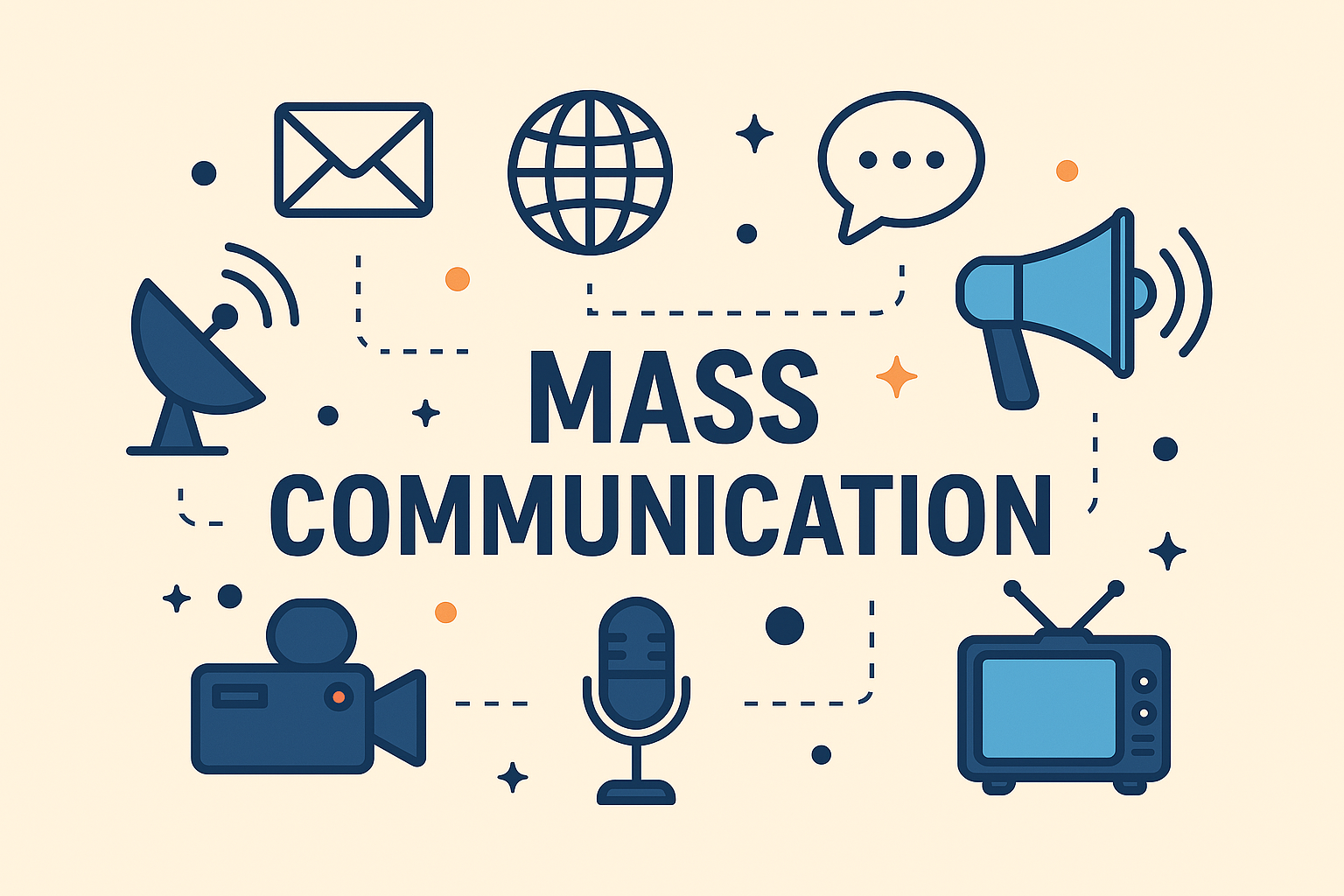In an era driven by information, communication, and technology, mass communication stands out as one of the most vibrant and impactful fields. Whether it’s journalism, advertising, digital content, or public relations, mass communication is the backbone of how societies connect, inform, and influence.
At BrainMould, we believe in empowering students with the knowledge to make informed career choices. If you’re exploring career options after 12th, a mass communication course might just be the perfect fit for your creative and communicative instincts.
In this comprehensive guide, we will walk you through everything you need to know about mass communication—what it is, available courses, top institutes, eligibility, career prospects, and more.
What is Mass Communication?
Mass communication refers to the process of creating, sending, receiving, and analyzing messages to large audiences via various forms of media. This includes:
- Print Media (Newspapers, Magazines)
- Electronic Media (TV, Radio)
- Digital Media (Websites, Social Media, Podcasts)
- Advertising & Public Relations
- Film & Documentary Production
The field is broad, and with the rise of digital platforms, its relevance has grown exponentially.
Why Choose Mass Communication?
If you are passionate about storytelling, love working with people, enjoy writing or speaking, or are fascinated by media and current events—this field offers an exciting career path.
Top reasons to choose Mass Communication:
- Creative Freedom: Explore ideas, craft narratives, and influence opinions.
- Dynamic Work Environment: Work in newsrooms, studios, agencies, or even as a freelancer.
- High Demand: The rise of digital platforms has created a need for skilled content creators, media professionals, and strategists.
- Diverse Opportunities: From journalism and filmmaking to digital marketing and advertising.
- Global Reach: A career in media can open doors to international exposure.
Who Should Pursue Mass Communication?
This field is ideal for students who have:
- Strong communication and writing skills
- A creative mindset
- Curiosity about the world and current affairs
- Passion for media, content creation, or public interaction
- Interest in storytelling, films, photography, or news
Courses in Mass Communication After 12th
Here are the most popular undergraduate programs:
1. Bachelor of Journalism and Mass Communication (BJMC)
- Duration: 3 years
- Curriculum: Journalism, advertising, media ethics, public relations, news writing, TV & radio production
2. BA in Mass Communication
- Duration: 3 years
- Curriculum: Focuses on theoretical and practical knowledge of media studies, film, and communication
3. Diploma in Mass Communication
- Duration: 1 to 2 years
- Ideal for: Students looking for early industry exposure
4. Certificate Courses (Online & Offline)
- Duration: 3 to 12 months
- Topics Covered: Content writing, digital marketing, social media, video editing
Top Colleges in India for Mass Communication
Here are some reputed institutions offering mass communication courses:
| College Name | Location | Courses Offered |
|---|---|---|
| Indian Institute of Mass Communication (IIMC) | New Delhi | PG Diploma in Journalism, Advertising, PR |
| Symbiosis Institute of Media and Communication | Pune | BA, MA in Mass Communication |
| Xavier Institute of Communications | Mumbai | Diploma, Certificate Courses |
| Delhi University (Lady Shri Ram College, IP College) | Delhi | BJMC |
| Jamia Millia Islamia | Delhi | BA in Mass Media, MA in Mass Communication |
| Christ University | Bangalore | BA, MA in Communication |
| Makhanlal Chaturvedi University | Bhopal | UG & PG Programs |
Eligibility Criteria
- For UG Courses:
- Completion of 10+2 from any stream (Arts/Commerce/Science)
- Minimum marks may vary (generally 50%+)
- Entrance exams in some colleges (like IPU CET, SET, CUET)
- For PG Courses:
- A bachelor’s degree in any discipline
- Entrance exams for institutions like IIMC, Jamia, etc.
Mass Communication Subjects & Syllabus
While it varies by course and institution, common subjects include:
- Communication Theories
- Reporting & Editing
- Media Laws & Ethics
- Public Relations & Advertising
- Film & Television Production
- Radio Journalism
- Digital Media & Content Creation
- Photography & Videography
- Research Methodology
Career Opportunities in Mass Communication
Here’s a glimpse of what you can do after a degree in mass communication:
1. Journalism
Work as a reporter, editor, anchor, or columnist in newspapers, TV, or digital platforms.
2. Public Relations
Represent brands, manage media relations, and handle crisis communication.
3. Advertising
Create impactful ad campaigns for companies, brands, or social causes.
4. Digital Marketing
Use SEO, social media, content marketing, and analytics to grow digital presence.
5. Radio & TV Production
Script, shoot, and produce engaging content for audio-visual media.
6. Filmmaking & Documentary
Become a scriptwriter, director, editor, or cinematographer.
7. Corporate Communication
Manage internal and external communications for businesses and brands.
8. Event Management
Plan, organize, and promote large-scale events and campaigns.
9. Content Writing & Blogging
Write for websites, magazines, social media, and digital platforms.
10. Social Media Management
Handle social media accounts, trends, and community engagement for clients.
Top Recruiters in Mass Communication
- NDTV
- Times Group
- Zee Media
- Hindustan Times
- Ogilvy & Mather
- Dentsu Webchutney
- Red FM
- Republic TV
- Aaj Tak
- Amazon, Flipkart (for digital marketing roles)
- Netflix, ALT Balaji (content teams)
- PR firms like Adfactors, Edelman, MSL
Salary Expectations
| Job Role | Average Starting Salary |
|---|---|
| Journalist/Reporter | ₹2.5 – ₹4 LPA |
| PR Executive | ₹3 – ₹5 LPA |
| Content Writer | ₹2.5 – ₹4 LPA |
| Digital Marketer | ₹3 – ₹6 LPA |
| TV/Radio Producer | ₹3 – ₹5 LPA |
| Copywriter | ₹3 – ₹5 LPA |
With experience, media professionals can earn ₹10 LPA and above, especially in digital or creative roles.
Scope of Mass Communication in India
India is one of the largest consumers of media content, and the growth of OTT platforms, online news portals, and digital campaigns has increased the demand for skilled media professionals.
Future trends include:
- Growth in regional content
- Rise of influencer and video marketing
- Data-driven journalism
- Podcasting and audio content
- Artificial Intelligence in media production
Challenges in Mass Communication
While the field is exciting, it also comes with challenges:
- High-pressure deadlines
- Need for creativity on demand
- Unpredictable work hours in media
- Intense competition
- Staying relevant with tech and trends
But with passion, resilience, and the right training, these challenges can become opportunities.
How BrainMould Can Help You Choose the Right Path
At BrainMould Career Counselling, we understand that choosing the right course can be overwhelming. That’s why we offer:
✅ Personalized career guidance
✅ Psychometric and interest-based assessments
✅ Profile-based course and college suggestions
✅ Mentorship from media industry professionals
✅ Help with entrance exam and admission processes
Conclusion
Mass communication is not just a course—it’s a powerful career choice for students who want to be heard, make a difference, and be at the forefront of society’s conversations.
Whether you’re inclined towards journalism, PR, content creation, or digital marketing, the field offers endless possibilities. And at BrainMould, we’re here to help you every step of the way.
FAQs on Mass Communication
Q1. Is mass communication a good career?
Yes! It offers high growth, creativity, and diverse opportunities in media, digital, and corporate sectors.
Q2. Which is better: BJMC or BA in Mass Communication?
Both are good. BJMC is more journalism-focused; BA offers broader communication studies.
Q3. Can I do mass communication without maths?
Absolutely. Most courses do not require mathematics.
Q4. What is the scope of mass communication in India?
Excellent—especially in digital media, advertising, and content marketing.
Q5. What should I do after a BJMC degree?
You can pursue a Master’s (MJMC), or start working in media, PR, digital agencies, or content creation.



Leave a Reply